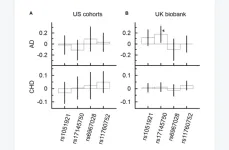(Press-News.org) A UBC Okanagan researcher is cautioning that a person’s poor eating habits established during post-secondary studies can contribute to future health issues including obesity, respiratory illnesses and depression.
Dr. Joan Bottorff, a Professor with UBCO’s School of Nursing, is one of several international researchers who published a multi-site study looking at the eating habits of university students. Almost 12,000 medical students from 31 universities in China participated in the study that aimed to determine the association between eating behaviours, obesity and various diseases.
The point, says Dr. Bottorff, is that many poor eating habits begin at university and can continue for decades.
“We know many students consume high-calorie meals along with sugary foods and drinks and there is lots of evidence to show those kinds of eating behaviours can lead to obesity,” says Dr. Bottorff. “These are not the only habits that lead to obesity, but they are important and can’t be ruled out.”
The study, published recently in Preventive Medicine Reports, was led by Dr. Shihui Peng with the School of Medicine at China’s Jinan University. While there is well-established research that links unhealthy diets to many chronic diseases, this study aimed to show a relationship between poor eating habits and infectious diseases including colds and diarrhea.
Dr. Bottorff notes, due to the nature of the study, it was not possible to show cause and effect but the relationship between poor eating habits, obesity and respiratory illnesses were well supported.
“There has been biomedical research that also supports this link between obesity and infectious diseases, and most recently this has been related to COVID-19,” she adds. “We know from some of the recent publications related to COVID-19, obese people were more likely to have severe conditions and outcomes. Reasons that have been offered for this increased vulnerability include impaired breathing from the pressure of extra weight and poorer inflammatory and immune responses.”
A typical student diet of high-sugar or high-calorie foods can become a long-term issue as these habits can lead to obesity. Dr. Bottorff says there is evidence to show that stress and anxiety can cause overeating, but overeating can also lead to stress and depression.
“The bottom line here is that we shouldn't be ignoring this risk pattern among young people at university. It is well documented that a significant portion of students have unhealthy diets,” she adds. “The types of foods they are eating are linked to obesity. And this can lead to other health problems that are not just about chronic disease but also infectious diseases.”
While Dr. Bottorff says students should be taught about healthy eating while at university the onus should be on the school to provide healthy, and affordable, food options for all students.
“We need to think about the food environment that we provide students. We need to ensure that in our cafeterias and vending machines, there are healthy food options so that they can eat on the go but also make healthy food choices.”
It’s not an issue going unnoticed. UBC Student Wellness and Food Services work together to address food security and food literacy and recognize that a lack of affordable food options, coupled with the stress of university life, can negatively impact students’ food choices.
Food insecure students have access to a low-barrier food bank and a meal share program. Meanwhile, UBCO Food Services’ culinary team prioritizes local, organic and sustainably-sourced ingredients, and works with a registered dietitian to ensure a wide variety of food options are available to all diners.
Dr. Bottorff agrees there have been improvements to food options in cafeterias and notes the drinks in many vending machines have been rearranging so healthier items are at eye-level and sugary choices are lower down.
“I know many post-secondary schools are trying to figure out how we can do better and are trying to address these problems,” she adds. “It's great, because four or five years ago, we weren't. So, I think we're on the right road, but I think we’re a long way from finished.”
END
A student’s poor eating habits can lead to a lifetime of illness
UBC Okanagan professor says universities should provide healthy, affordable food options
2023-05-24
ELSE PRESS RELEASES FROM THIS DATE:
Recent UCLA computer grad constructs “Crown Jewel of Cryptography”
2023-05-24
ACM, the Association for Computing Machinery, today announced that Aayush Jain receives the 2022 ACM Doctoral Dissertation Award for his dissertation “Indistinguishability Obfuscation from Well-Studied Assumptions,” which established the feasibility of mathematically rigorous software obfuscation from well-studied hardness conjectures.
The central goal of software obfuscation is to transform source code to make it unintelligible without altering what it computes. Additional conditions may be added, such as requiring the transformed code to perform ...
Meet the 2023 ASBMB Advocacy Training Program delegates
2023-05-24
The American Society for Biochemistry and Molecular Biology announced the 12 delegates who will participate in the society’s Advocacy Training Program this summer.
The ATP is a three-month summer externship that provides hands-on science policy and advocacy training and experience. After completing the educational component of the program, delegates will visit Capitol Hill to meet with policymakers in 2024. The ASBMB public affairs department runs the program.
The society has trained 42 ASBMB members in four ATP cohorts, providing the foundational knowledge, skills ...
Does having Alzheimer’s genes increase your risk of epilepsy?
2023-05-24
MINNEAPOLIS – People with a genetic predisposition for Alzheimer’s disease may have an increased risk of epilepsy and people with a certain type of epilepsy may have an increased risk of developing Alzheimer’s disease, according to a study published in the May 24, 2023, online issue of Neurology®, the medical journal of the American Academy of Neurology.
“Our research found that not only are people with Alzheimer’s disease more likely to develop epilepsy, but also that those with focal epilepsy, which accounts for ...
New study shows 1 in 5 “healthy” individuals actually have the metabolism of a prediabetic
2023-05-24
Scientists at Klick Labs have developed a new way to catch the earliest signs the human body is failing to control blood glucose levels, before it reaches prediabetic levels in patients.
In findings published today in Mayo Clinic Proceedings: Digital Health, researchers outlined a new method of analysis that flags a precursor to prediabetes called impaired glucose homeostasis (IGH). When they applied their patented mathematical method to data obtained from continuous glucose monitors (CGMs), scientists found about one in five study participants, considered healthy by medical standards, actually had glucose metabolism similar to those with prediabetes.
“For people ...
New UCI-led research shows people who live to be 90+ with superior thinking skills are resilient to Alzheimer’s pathology in their brains
2023-05-24
Irvine, CA – May 24, 2023 – A University of California, Irvine-led team of researchers have discovered that the oldest-old, those who live to be 90+ and have superior cognitive skills, have similar levels of brain pathology as Alzheimer’s patients, however, they also have less brain pathology of other neurodegenerative diseases that cause memory and thinking problems.
The study, “Superior Global Cognition in Oldest-Old is Associated with Resistance to Neurodegenerative Pathologies: Results from the 90+ Study,” was published in the Journal of Alzheimer’s Disease.
“People ...
Survival pathway and therapeutic target in metastatic colorectal and pancreatic cancer
2023-05-24
“Recent findings suggest that neurodegenerative and cardiovascular diseases may have overlapping etiologies [...]”
BUFFALO, NY- May 24, 2023 – A new research paper was published in Aging (listed by MEDLINE/PubMed as "Aging (Albany NY)" and "Aging-US" by Web of Science) Volume 15, Issue 9, entitled, “Exogenous exposures shape genetic predisposition to lipids, Alzheimer’s, and coronary heart disease in the MLXIPL gene locus.”
In this new study, researchers Yury Loika, Elena Loiko, Fan Feng, Eric Stallard, Anatoliy I. Yashin, Konstantin Arbeev, Allison L. Kuipers, Mary F. Feitosa, Michael A. Province, and Alexander ...
Researchers identify strong T-cell response in first-in-human nanoparticle HIV vaccine
2023-05-24
SEATTLE – MAY 24, 2023 – Researchers from Fred Hutchinson Cancer Center in Seattle, Scripps Research in La Jolla, California, IAVI and other collaborating institutions have characterized robust T-cell responses in volunteers participating in the IAVI G001 Phase 1 clinical trial to test the safety and immune response of a self-assembling nanoparticle HIV vaccine.
Their work, published in Science Translational Medicine, signals a major step toward development of a vaccine approach to end the HIV/AIDS ...
Clinicians supporting cancer patients with taste loss need educational materials and training
2023-05-24
AMHERST, Mass. – While an overwhelming majority of cancer patients experience taste disruption from their disease or treatment, they have consistently reported a lack of support from their doctors about this troubling side effect, according to research.
A new study by the University of Massachusetts Amherst, focusing for the first time on the issue from the cancer clinicians’ point of view, reveals not a lack of concern about their patients’ taste loss but a lack of access to educational materials, ...
Epigenetic landscape modulates pioneer transcription factor binding
2023-05-24
(Memphis, Tenn.—May 24, 2023) Like thread tightly wrapped around a spool, DNA is wrapped around histones and packaged into structures called nucleosomes. Scientists at St. Jude Children’s Research Hospital are exploring how a type of transcription factor called a pioneer transcription factor accesses DNA even when it is tightly wound. Their work revealed how the epigenetic landscape influences transcription factor binding. Problems with transcription have been implicated in numerous cancers, so this more detailed understanding of the process may aid in developing future therapeutics. The study ...
A popular compostable plastic doesn’t break down in the ocean
2023-05-24
A widely used compostable plastic persists unchanged in marine environments for at least 14 months, according to a new study in the open-access journal PLOS ONE by Sarah-Jeanne Royer and colleagues from Scripps Institution of Oceanography at the University of California, San Diego. The study highlights the distinction between textile materials that can be composted in a controlled, industrial setting (PLA), and the ones that can undergo biodegradation in natural environments (cellulose-based textiles).
The accumulation and persistence of oil-based plastic waste ...
LAST 30 PRESS RELEASES:
Differing immune responses in infants may explain increased severity of RSV over SARS-CoV-2
The invisible hand of climate change: How extreme heat dictates who is born
Surprising culprit leads to chronic rejection of transplanted lungs, hearts
Study explains how ketogenic diets prevent seizures
New approach to qualifying nuclear reactor components rolling out this year
U.S. medical care is improving, but cost and health differ depending on disease
AI challenges lithography and provides solutions
Can AI make society less selfish?
UC Irvine researchers expose critical security vulnerability in autonomous drones
Changes in smoking status and their associations with risk of Parkinson’s, death
In football players with repeated head impacts, inflammation related to brain changes
Being an early bird, getting more physical activity linked to lower risk of ALS
The Lancet: Single daily pill shows promise as replacement for complex, multi-tablet HIV treatment regimens
Single daily pill shows promise as replacement for complex, multi-tablet HIV treatment regimens
Black Americans face increasingly higher risk of gun homicide death than White Americans
Flagging claims about cancer treatment on social media as potentially false might help reduce spreading of misinformation, per online experiment with 1,051 US adults
Yawns in healthy fetuses might indicate mild distress
Conservation agriculture, including no-dig, crop-rotation and mulching methods, reduces water runoff and soil loss and boosts crop yield by as much as 122%, in Ethiopian trial
Tropical flowers are blooming weeks later than they used to through climate change
Risk of whale entanglement in fishing gear tied to size of cool-water habitat
Climate change could fragment habitat for monarch butterflies, disrupting mass migration
Neurosurgeons are really good at removing brain tumors, and they’re about to get even better
Almost 1-in-3 American adolescents has diabetes or prediabetes, with waist-to-height ratio the strongest independent predictor of prediabetes/diabetes, reveals survey of 1,998 adolescents (10-19 years
Researchers sharpen understanding of how the body responds to energy demands from exercise
New “lock-and-key” chemistry
Benzodiazepine use declines across the U.S., led by reductions in older adults
How recycled sewage could make the moon or Mars suitable for growing crops
Don’t Panic: ‘Humanity’s Last Exam’ has begun
A robust new telecom qubit in silicon
Vertebrate paleontology has a numbers problem. Computer vision can help
[Press-News.org] A student’s poor eating habits can lead to a lifetime of illnessUBC Okanagan professor says universities should provide healthy, affordable food options




